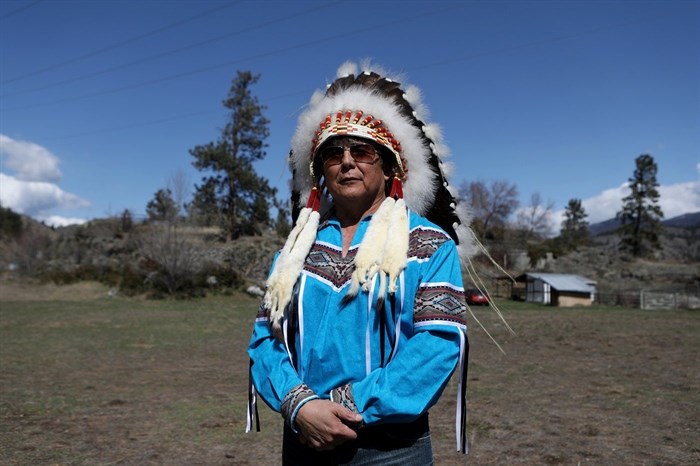
y?ilmix?m ki law na Chief Clarence Louie of Osoyoos Indian Band stands on a piece of original Osoyoos Indian Reserve land on April 14, 2023.
Image Credit: Aaron Hemens, Local Journalism Initiative
December 03, 2023 - 3:30 PM
Land acknowledgements are a part of daily life here in the Okanagan. Before meetings, lectures, events, and emails we are reminded that we are situated on the traditional, unceded territory of the Syilx Okanagan People. But is that enough to establish real Truth and Reconciliation?
Chief Clarence Louie from the Osoyoos Indian Band told iNFOnews.ca if the acknowledgements were truly sincere, old reserve land would be returned to First Nations peoples.
“To me, reconciliation has to start with the land. Land acknowledgments are a nice, small gesture,” Chief Louie said. “But really, in saying land acknowledgments, if you want to put those words to the test, to a real test, then we want our land back.”
Earlier this year, the Osoyoos Indian Band celebrated the return of sacred fishing land that the Syilx people had been denied access to for more than 100 years.
READ MORE: LAND BACK: Osoyoos Indian Band reclaims sacred salmon fishing site
When asked if he saw the return of the land as a small victory, Chief Louie said victory wouldn't be the right word.
“I mean, we had to buy it back with our own hard-earned money,” he said. “And so be it, because government is slow at putting reconciliation to adult steps and not these small little baby steps.”
Chief Louie is advocating for the return of old reserve land. The land was taken when reserves were reduced to make way for settlement, he said.
“(In) 1877 and later on in 1915, when the government in their colonial wisdom went around and reduced Indian reserve sizes,” Louie said. “Because of settler pressure, settlers saying, those Indians aren't doing anything with their land. We need it.”
The land taken from the Osoyoos Indian Band reserves amounts to more than 4,000 acres, Louie said.
“We're over 4,000 acres short of reconciling our Indian Reserve land.”
The majority of that land is now under private ownership. However, the small portion of Crown land still under government control is what the Band wants returned.
The process by which that land came to be under provincial and federal control is unique in British Columbia.
According to the BC Government Website, in most parts of Canada, the British Crown established treaties with First Nations before Canada was formed. However, in B.C., this process was never completed. This means that much of the land was never lawfully exchanged.
“To me, the word unceded is just a nicer way of saying stolen,” Chief Louie said. “If they took reconciliation to heart, people would be saying… we're holding our meeting on the stolen land of the Okanagan nation people.”
READ MORE: How Okanagan land acknowledgements could be more meaningful
“How long does a crime last? Somebody steals something from you, they should give it back. Unconditionally,” he said. “Because they can't not admit that they stole it. I mean, historical documents are there for anybody to read. Historical maps are there for anybody to see. That was land meant for the Osoyoos Indian Band.”
Louie said Truth and Reconciliation must be put to a real test, something more meaningful than cheap words and flying First Nations flags at municipal halls.
“True reconciliation can't be done on the cheap,” he said. “I mean, you can't have an economy on a reserve without land. They took away our… best lands.”
Louie estimates that close to 95% of the Band's formerly owned reserve land is now privately property and therefore off the cards.
“There’re still some acres of Crown land that the government controls, and that's the land we say ‘land back’,” he said. “Let's put reconciliation to the test. Give our land back if you believe in truth and reconciliation."
"95% of it is in private ownership, which is off the table. We understand that," he said. "But government to government, nation to nation, when a nation stole something... That's something that's never forgotten about and that's at the core of our relationship."
Returning the land wouldn't just be a step towards mending First Nations and settler relationships, it would be a step towards justice, Louie said.
“The government, whether it's federal or provincial, or our municipal, don't they use the word honour a lot in their statements? Don't they call themselves honourable people?” Louie said. “If you want to hold up that word and have it be a genuine word, then give us our stolen land back. It's a matter of honour. It's a matter of respect and truth and reconciliation.”
You can find out more about the Osoyoos Indian Band here.
To contact a reporter for this story, email Georgina Whitehouse or call 250-864-7494 or email the editor. You can also submit photos, videos or news tips to the newsroom and be entered to win a monthly prize draw.
We welcome your comments and opinions on our stories but play nice. We won't censor or delete comments unless they contain off-topic statements or links, unnecessary vulgarity, false facts, spam or obviously fake profiles. If you have any concerns about what you see in comments, email the editor in the link above. SUBSCRIBE to our awesome newsletter here.
News from © iNFOnews, 2023